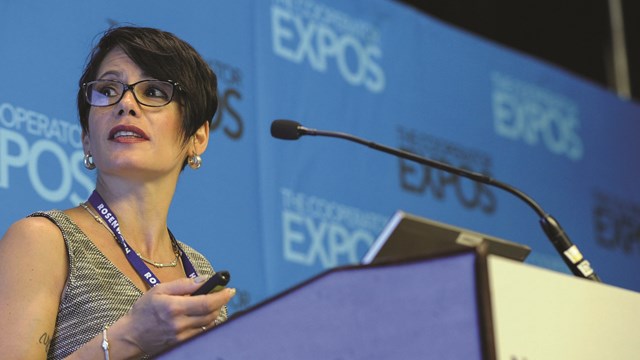Efficient condo and co-op boards make a building run smoothly—but the most effective ones don’t work alone; they understand how to work together with other industry professionals, including property managers, attorneys, accountants, and others. What do the best boards have in common? And how can professionals tell when they’re working with a collaborative board versus one in need of improvement?
According to Keith Werny, president of FirstService Residential CityLine Division, the hallmarks of a good board include consistency in communication, adhering to corporate documents, and working as a team. “Communication is the most important piece to set expectations for the management team and to build trust among the residents, building staff, and their professional partners,” he adds.
“A good board ensures that they are well prepared and organized before meetings,” adds attorney Jennifer Alexander, of New Jersey-based law firm Griffin Alexander. “In our experience, boards who have a prepared and well-organized agenda and who are ready to have an open and transparent dialogue with their community tend to achieve more successful outcomes.”
One constant through-line among all the professionals consulted for this article is that the best, most effective boards communicate well with each other, and respect each other even when they’re not the best of friends. They have explicitly stated goals, and are committed to achieving them.
Trust Your Experts
In addition to communicating clearly, board members need to trust their fellow professionals. “The average board member is someone who owns their unit, but they don’t have the background in all areas,” says Edward Mackoul, CPCU, CIC at New York-based insurance broker Mackoul Risk Solutions. “They need to trust the people they hire. Whether it’s your insurance broker, your attorney, your accountant… you want to make sure they specialize in co-ops and condos. After all, you wouldn’t go to a podiatrist for brain surgery. They’re both doctors, but they have different specialist areas. It’s the same in this industry. If you trust their specialty, you can trust their opinion.”
“It’s important for board members to embrace management as their trusted advisor, a resource that works with them to increase the value of their property and protect the interests of their community,” says Werny. “Boards don’t have to figure out everything on their own–in fact, they shouldn’t. The best working relationships are with boards who understand our end game is to support them through every challenge.”
It’s also important to work closely with your management company. A manager is not just an entity doing work–they’re meant to be a partner and trusted advisor guiding your board to accomplish its goals and do what’s best for the community. “There also needs to be a share of voice,” Werny continues. “There should not be just one person making every decision on behalf of the board. A board that works collaboratively will best represent the interests of the community.”
Working Together
A well-functioning board prioritizes the best interests of the entire community. “Communication is key,” says Alexander. “Board members need to make sure that they are comfortable sharing their ideas with each other—even though they may respectfully disagree—and must remember that although they have their own opinions, it’s the majority vote of the board that prevails.”
Werny notes that “if you compare a board to a well-run sports franchise, the players and leadership are working together to be successful, and that can’t happen without trust and partnership. As an individual, you can only get so far, but as a team, you can achieve great success. That’s how I look at the boards we partner with.” It’s important that the board, management, and staff are aligned and operate as one team to make the right decisions and position the community for success.
He recalls managing a complex building with multiple entities and a substantial commercial component, all of which made the annual budgeting process especially challenging. To make accurate allocations for the various entities, the board decided to submeter all the commercial and residential spaces. “There was a lot of back and forth,” he says, “but throughout the entire process, the board was committed to fair allocations across all entities, and the lines of communication were always open. The board could have easily pushed for what benefited individual owners, but instead decided to do what was best for the entire community.”
Being open to hear a range of perspectives and taking into account everyone’s views also helps boards make the best decisions. Board members are humans and come in with different personalities, preferences, and approaches, of course, but, says Manhattan-based real estate attorney Adam Leitman Bailey, “The flow of uninterrupted communication and respect for ideas cannot be underestimated. Insults and criticism should be left outside the meeting room. They can kill a good board from getting things done.”
Bailey reflects on an instance when a well-run board had what they considered an ‘unconventional’ director. The board used a simplified version of Robert’s Rules of Order, and therefore, this director felt not only part of the group, but also encouraged to speak at meetings. The board was meeting with government representatives through their counsel’s connections to request financial aid from the city and state. “Each board member could speak, and motions were made to try to help the building—no matter how small the issue.”
“One day [the director] came to the meeting with several governmental representatives, and they announced that the City and State would fund over 60 million dollars in serious repairs the building needed that would not have to be paid back,” Leitman Bailey continues. “Working as a board helped save the building.” Every member turned out to be an essential part of the board.
Getting Educated
In addition to collaboration, the most productive board meetings are the result of being prepared and proactive. The best boards do their homework and prepare for meetings before they convene–taking the time to review items and gather all the necessary information. They can continue learning by taking advantage of educational resources offered by industry professionals, including lunch-and-learns, webinars, online courses, on-demand training, in-person seminars at trade shows like the biannual Cooperator Expo, and publications like this one. “It educates people on key areas,” says Mackoul. “Board members need to be able to learn. Classes are helpful, and I would advise them to take as many as they can.”
When Good Boards Go Bad
Why does having a well-educated, well-informed, and engaged board matter? For the same reason those exact traits help keep any democratic community sound and solvent. Boards that devalue accountability, teamwork, and transparency tend to reap what they sow. “Boards that turn into dictatorships rarely do well,” warns Leitman Bailey. “When speech is curtailed, meetings are called less frequently and elections are delayed.” This in turn leads to dissatisfaction and alienation among residents, which almost inevitably leads to costly litigation. “These buildings will spend the most money digging out of their problems in the future.”
Mackoul warns that nepotism can also tarnish a board’s reputation. “You might find someone who will prioritize working with a family member or friend over someone who is actually the best in an area,” he says, “That would be a red flag.” Sometimes nepotism is more about trying to find the best price for a project or service than about anything nefarious, but Mackoul also warns against boards being cheap. “Everybody is looking to save money,” he says, “but sometimes cheap is cheap. For example, I’ve seen boards remove their directors and officers (D&O) liability coverage, which covers boards for the decisions they make. They cancel the policy to save money because they think that’s what’s best, but saving $1,000 one year could end up costing them $100,000 down the road. If you’re proactive, especially from an insurance standpoint, you can maintain control. It’s a lot easier to do something before it’s a problem.”
When individual interests override community interests, the results can put a board at serious risk of not just damaged credibility and reputation, but legal exposure as well. “It’s easy for a good board to turn bad, and difficult for a bad board to turn good,” cautions Werny. “Emails to professionals that include unprofessional language and unrealistic demands, or a thread of emails that contradict prior decisions made by the board are also indicators that the board may be a challenge to support.”
Being In Alignment
A board, and therefore a building, can be great when everyone trusts each other to do their jobs. By supporting each other, they make each other better. Alexander adds that “when a board has the right support around it, for example through association attorneys and other vendors and agents, it helps the board fulfill their fiduciary duties and achieve a well-run community.”
Mackoul notes that having a good relationship with professionals, prioritizing what’s best for the association, and being proactive, as well as learning, all make a board stronger. Well-crafted communications to owners and shareholders will often yield greater attendance and participation in annual meetings, which is the ultimate compliment. Infrequent or vague communication can lead to contentious annual meetings and leave participants with a sour impression of the board.
“Board alignment is more than a hashtag–it’s how the people in charge of their community can protect owners and shareholders, mitigate risk, and create a culture within the property that makes residents feel at peace in their homes,” says Werny.
Kate Mattiace is associate editor of CooperatorNews.










Comments
Leave a Comment